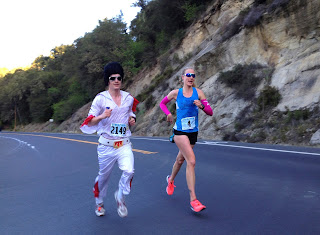 |
| Top: Photo used with permission. Copyright Glenn Tachiyama. Bottom: From Miwok 100k last year. |
Badger Mt 50k in the Tri Cities, WA, has an exposed course with around 6,000ft of climb. It was only six days after I trashed my legs at the Gorge Waterfalls 50k and I thought it'd be a good idea at the last moment to try to take it easier and switch my mind-set by making it a charity run for my local Humane Society of Central Oregon and run it as Elvis (donate here if you think my silliness is worth a few dollars).
The Elvis costume, especially the wig, is now is pretty bad shape after four marathons, one 100k and a half marathon. This 50k pretty much finished it off and I was not Elvis at his perfectly coiffeured best. I was kind of like Elvis in his final days but much skinnier.
The plan made sense and I tried to take it a little easier than last weekend, but Justin Yates from Missoula, MT, zoomed up the climbs and I decided to try to keep him in sight. Last year's winner set the CR in 4:51 so I thought something around 4:20 would be around the front. Justin had other ideas and I chased him all day, losing ground on each climb and gaining some back downhill.
It's basically an out and back with three big(ish) climbs each way:
But it wasn't well marked and we both went off course multiple times. The 100 milers who started 24 hours previously must have struggled to navigate, especially in the dark.
I had a fun day and couldn't keep Justin in sight for the final climb but felt much better than last weekend. However, I didn't really take it easy at all and ended up finishing in 3:56. Justin was a few minutes ahead, smashing the CR with 3:53 and both of us were a lot quicker than I expected anyone to be running. These past couple of weeks are starting to show a benefit in my training so summer should be fun. Results will be here when they're posted. Bend had another good day after last week's Gorge Waterfalls 50k as Darla Askew set a new CR in 4:46 (she qualified for WS100 at Waldo last year so will be running there too).
One consolation I had every time I struggled up a climb or got almost blown over (the wig mainly stayed on by itself) in the high gales around the turnaround, was that I was doing something much more fun than the Barkley 100, which started about the same time. Those poor b@stards going through misery and getting their legs torn to shreds by the bracken as they do somewhere between 10,000 and 12,000ft of climb for every 20 mile loop. I feel very smug right now, but good luck to everyone out there. They have a couple of days left at most so could maybe catch this blog while they're stumbling along (I'm talking to you, James Adams, who will undoubtedly be playing with your phone if it has any reception).









